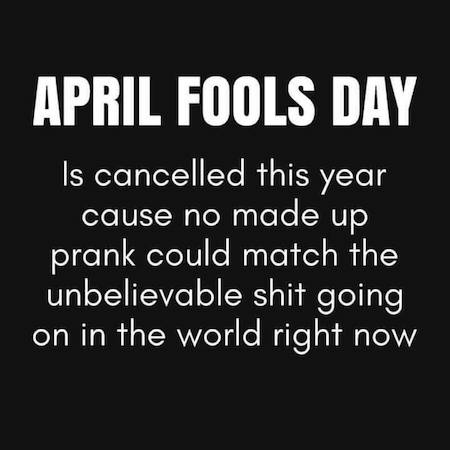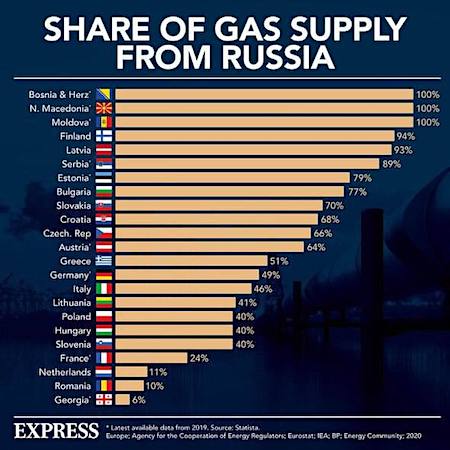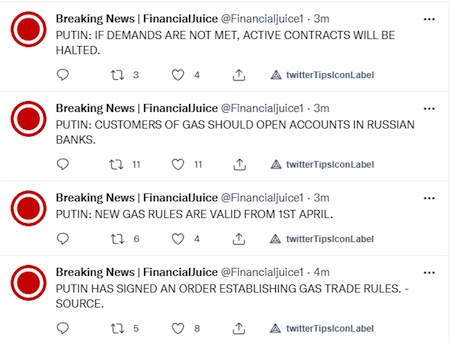
Rembrandt van Rijn The Anatomy Lesson of Dr. Nicolaes Tulp 1632





It really is this simple.
• Ukraine: Transfer of Power Balance from West to East (Leckie)
The Russian military is running an “economy of effort” operation. It has effectively fixed in place the garrisons defending Ukraine’s major cities leaving them incapable of supporting the troops in the Donbass. Meanwhile Russia is progressively destroying the military infrastructure of the Ukraine (resupply, maintenance and command and control facilities and weapon systems such as air defense, artillery and armored vehicles) through a combination of air strikes, cruise missiles, rockets and traditional artillery across the breadth and depth of Ukraine. Approximately 60,000 of Ukraine’s best trained and equipped troops are located in the Donbass.
It would appear unlikely that this force is capable of anything other than localized tactical level manoeuvre at this point due to a combination of ever dwindling supplies of ammunition, fuel and rations, Russia’s dominance in the air and ground based combat power, and the effects of combat to date. Despite the alleged incompetence of the handling of the initial stages of the war, the Pentagon assesses that the Russian forces still retain nearly 90 percent of the initial combat power assigned to the invasion. With Russian forces on the verge of completing the capture of Mariupol, it will only be a matter of time before the Ukrainian forces in the Donbass are fully encircled and subsequently destroyed or forced to surrender.
Whilst there may be many weeks, or even months of fighting ahead, the writing is on the wall that Russia, barring outside intervention (i.e. NATO — which has repeatedly ruled out direct military intervention), will achieve its military objectives. The direct Russo-Ukraine conflict is however just one level of this conflict. Ukraine is actually an unfortunate pawn in the much bigger conflict. As long time Russia analyst Gilbert Doctorow notes this is a “full-blown proxy war between the United States of America and the Russian Federation, and it is about ending or perpetuating American global hegemony.” Whilst the war in Ukraine will end sooner or later, the implications at a global scale of this proxy war will be of much greater consequence for a much greater period of time.

“..trifecta (imminent blitzkrieg on Donbass; US bioweapon labs; Ukraine working on nuclear weapons) as the casus belli..”
• The New, Resource-Based Global Reserve Currency (Escobar)
The Russian Central Bank nationalized foreign exchange earnings of all major exporters. There was no default. The ruble keeps rising – and is now back to roughly the same level before Operation Z. Russia remains self-sufficient, food-wise. American hysteria over “isolated” Russia is laughable. Every actor that matters across Eurasia – not to mention the other 4 BRICS and virtually the whole Global South – did not demonize and/or sanction Russia. As an extra bonus, arguably the last oligarch capable of influence in Moscow, Anatoly Chubais, is gone. Call it another momentous historical trickery: Western sanction hysteria de facto dismembered Russian oligarchy – Putin’s pet project since 2000. What that implies is the strengthening of the Russian state and the consolidation of Russian society.
We still don’t have all the facts, but a case can be made that after years of careful evaluation Putin opted to really go for broke and break the West’s back – using that trifecta (imminent blitzkrieg on Donbass; US bioweapon labs; Ukraine working on nuclear weapons) as the casus belli. The freezing of foreign reserves had to have been forecasted, especially because the Russian Central Bank had been increasing its reserves of US Treasuries since November last year. Then there’s the serious possibility of Moscow being able to access “secret” offshore foreign reserves – a complex matrix built with Chinese insider help.
The sudden switch from dollars/euros to rubles was hardcore, Olympic-level geoeconomic judo. Putin enticed the collective West to unleash its demented hysteria sanction attack – and turned it against the opponent with a single, swift move. And here we all are now trying to absorb so many in-synch game-changing developments following the weaponization of dollar assets: rupee-ruble with India, the Saudi petroyuan, co-badged Mir-UnionPay cards issued by Russian banks, the Russia-Iran SWIFT alternative, the EAEU-China project of an independent monetary/financial system.
Not to mention the master coup by the Russian Central Bank, pegging 1 gram of gold to 5,000 rubles – which is already around $60, and climbing. Coupled with No Rubles No Gas, what we have here is energy de facto pegged to gold. The EU Chihuahuas and the Japanese colony will need to buy a lot of rubles in gold or buy a lot of gold to have their gas. And it gets better. Russia may re-peg the ruble to gold in the near future. Could go to 2,000 rubles, 1,000 rubles, even 500 rubles for a gram of gold.

No disruptions, but a lot of support for the ruble. Also from much higher prices. Who’s winning?
• Putin Says Russia to Keep Supplying Gas Amid Shift to Rubles (BBG)
Russia aims to keep supplying gas to European customers even as it demands they shift to payment in rubles, President Vladimir Putin said, easing fears that the shift could lead to disruptions from the continent’s biggest supplier. “Russia values its business reputation, we have complied and will comply in the future with obligations under all contracts, including gas contracts,” he told officials in televised comments laying out the new mechanism for ruble payments. “We will continue to supply gas in the volumes and at prices set down in the current long-term agreements,” he added, warning that shipments would be stopped for customers who don’t accept the new terms starting Friday.
European officials said the change isn’t likely to affect supplies. “For us, with regard to Putin’s threat or announcement or plan — one doesn’t really know what to call it anymore — to get paid in rubles, the main point is that the contracts are being kept,” German Economy Minister Robert Habeck said. When Putin first announced the ruble-payment demand last week, European officials rejected it, saying the move would violate contract terms. But the Kremlin Thursday published a presidential decree outlining the mechanism to allow foreign buyers to convert their dollars and euros into the Russian currency through a state-controlled bank. European benchmark gas jumped after the order was published but pared gains later. Fear of a possible cutoff of Russian gas — worsened by the threats on ruble payments — had driven prices higher in recent days.
An official at the French presidency, speaking on condition of anonymity, said the new mechanism doesn’t change the payments as mandated in the contracts, which will continue as before. But the official said France is preparing a contingency plan for gas, given all the uncertainties. Putin initially portrayed the move against “unfriendly countries” as retaliation for sweeping Western sanctions imposed over his invasion of Ukraine. The Kremlin, seeking to use its leverage as Europe’s largest gas supplier, hinted it might cut off countries that refused. But the Group of Seven leading industrial nations flatly rejected the demand, saying it violated contractual terms. Authorities in Germany and Austria warned that the dispute could lead to an interruption in vital supplies.
Gas buyers were still seeking clarity on the change Thursday. Germany’s E.ON SE said it’s not clear which contracts are covered, while Denmark’s Orsted AS said it hasn’t been approached by Russian gas giant Gazprom and until that happens, assumes the contract conditions are unchanged. Payments for gas shipped in April are due late in the month or in May, depending on the contract, according to a person familiar with Russia’s supply deals. German Chancellor Olaf Scholz, who discussed the issue in a call with Putin, said Thursday, “in any case, it remains the case that companies want to, can and will continue to pay in euros.”


I just said: NO disruptions.
• German Chemical Giant Warns Of “Total Collapse” If Russian Gas Supply Cut (ZH)
CEO of Germany’s multinational BASF SE, the world’s largest chemical producer, has warned that curbing or cutting off energy imports from Russia would bring into doubt the continued existence of small and medium-sized energy companies, and further would likely spiral Germany into its most “catastrophic” economic crisis going back to the end of World War 2. Company CEO Martin Brudermuller issued the words in an interview with Frankfurter Allgemeine newspaper just ahead of German officials by midweek giving an “early warning” to industries and the population of possible natural gas shortages, as Russia appears ready to firmly hold to Putin’s recent declaration that “unfriendly countries” must settle energy payments in rubles, related to the Ukraine crisis and resultant Western sanctions.
According to Bloomberg he mused that while “Germany could be independent from Russia gas in four to five years” it remains that “LNG imports cannot be increased quickly enough to replace all Russian gas flows in the short term.” But in the meantime, Brudermuller described that “It’s not enough that we all turn down the heating by 2 degrees now” given that “Russia covers 55 percent of German natural gas consumption.” He emphasized that if Russian gas disappeared overnight, “many things would collapse here” – given that “we would have high levels of unemployment, and many companies would go bankrupt. This would lead to irreversible damage.” He continued:
“To put it bluntly: This could bring the German economy into its worst crisis since the end of the Second World War and destroy our prosperity. For many small and medium-sized companies in particular, it could mean the end. We can’t risk that!” The dire warning of coming disaster in the event Russian gas is shut off came in response being questioned over whether it’s at all possible to abandon Russian energy. Asserting that this issue is not “black and white” – and that the German economy stands on the brink of catastrophe, the BASF CEO said that if this standoff continues to escalate it will “open the eyes of many on both sides”…


View from China.
• 31 Years After End of Warsaw Pact, NATO Continues As Regional Disrupter (GT)
It has been 31 years since the formal dissolution of the military structures of the Warsaw Pact on March 31, 1991. NATO, another product of the Cold War era, however, has not dissolved with the end of the Cold War and the disbandment of the Warsaw Pact. NATO’s activities have aroused regional and global insecurities. And the ongoing Ukraine crisis was largely triggered by the bloc’s eastward expansion. The continued existence of NATO is mainly to serve the global military hegemony system of the US. Even in the era of the Cold War, the US-led NATO was not only meant to counter the Warsaw Pact, but also served as a tool to dominate the world militarily. This was reinforced after the end of the Cold War. Through military cooperation, Washington can put a grip on many Western countries, especially those in Europe.
As a member of the military group, Europe has been heavily impacted by the US in terms of defense policy and strategic decisions. As Washington has regarded Moscow as its foe and rival, it has exploited many European countries to contain and deter it. Today, NATO has become an instrument to maintain US’ military hegemony. NATO has set a target of 2 percent of a member state’s GDP to spend on defense. But many countries have failed to meet the target in the past several years, to the annoyance of the US. As a response to the Ukraine crisis, more countries vowed to raise spending to 2 percent. Furthermore, the US took advantage of the Ukraine crisis to sell more weaponry to Europe and ramp up its military deployment against Russia. It can be said that the ongoing Russia-Ukraine crisis has intensified Washington’s control over NATO members in Europe.
After the end of the Cold War, in a bid to prove the value and legitimacy of its existence, NATO has created various imaginary enemies and provoked regional conflicts many times, including the Ukraine crisis. Some experts said that the absolute security of NATO is the absolute insecurity of the rest of the world. With NATO’s eastward expansion, the bloc has intensified conflict with Russia and greatly suppressed its strategic space. This has worsened Russia-Europe relations and threatened the peace and stability of Eastern Europe. The pursuit of absolute security has indeed led to regional and global instability. French President Emmanuel Macron said in 2019 that NATO was experiencing “brain death.” On March 17, he told a press conference that he took “full responsibility” for what he said in 2019, but added that “Russia has just provided an electroshock … the awakening” with its military operations in Ukraine.

Even the alt media in the west feel obligated to start a report like this with: “Amid overwhelming evidence that Russian forces have committed war crimes during an unprovoked war of aggression in Ukraine.. “
• Ukraine Journalist Finds Charred Remains Where War Crime Was Filmed (IC)
Amid overwhelming evidence that Russian forces have committed war crimes during an unprovoked war of aggression in Ukraine, Ukrainian officials were confronted this week with video that appeared to show Ukrainian soldiers shooting captive Russian soldiers in the legs. Although Ukraine’s senior military leader and its domestic intelligence agency both insisted that the video posted on social networks on Sunday was “a fake” produced by Russia, an adviser to Ukrainian President Volodymyr Zelenskyy promised that the government would investigate and punish those responsible if the incident did take place. On Monday, a well-known Ukrainian journalist, Yuri Butusov, published graphic video showing the charred remains of three men he identified as Russian soldiers, as Ukrainian forces recaptured the town of Malaya Rohan, outside Kharkiv, over the weekend.
Although Butusov made no mention of the video of the alleged war crime, a visual analysis of his footage shows that it was clearly filmed in the same location as the video of the prisoners being shot, some time after that incident. Reporting by open-source investigators and BBC News had already established that the video of the alleged war crime was recorded at a dairy processing plant in Malaya Rohan, which is about 3 miles east of Kharkiv. Multiple visual clues in Butusov’s video show that he discovered the burned bodies in precisely the same part of the dairy plant’s courtyard where, in the prior video, at least eight captives were filmed bleeding on the pavement, several with their hands bound behind their backs and bags over their heads.
According to Butusov, the editor of the Ukrainian news site Censor.net, he arrived in Malaya Rohan “a few hours after the battle” there. By that time, his footage shows, several of the buildings at the dairy factory had been partially destroyed by explosions or fire. Those same structures had not yet been damaged when the video showing the prisoners being shot was recorded.

Durham won’t let go.
• Fight With Clinton Campaign And DNC Looms In Sussmann Case (Pol.)
A looming legal battle could reveal new details about the decision by Hillary Clinton’s 2016 presidential campaign to commission a research project that produced a controversial dossier on Donald Trump’s alleged ties to Russia. Prosecutors on special counsel John Durham’s team handling a criminal false-statement case against a top lawyer for Democratic causes, Michael Sussmann, indicated on Thursday that they planned to challenge claims of attorney-client privilege raised by the Democratic National Committee and Clinton’s campaign. The issue has lingered for years, with the Democratic groups claiming that the investigative firm that produced the dossier, Fusion GPS, did so as part of attorney-requested research related to potential litigation.
However, Durham’s prosecution of Sussmann, a former Perkins Coie partner, may bring the question to a head as prosecutors seek to call witnesses from the law firm and Fusion GPS. “It’s obviously a bit of a hornet’s nest,” defense attorney Sean Berkowitz said on Thursday during a pretrial hearing for Sussmann, who’s accused of lying to the FBI by denying he was working for any client when in September 2016 he brought FBI general counsel James Baker computer data that hinted at links between Trump entities and Russia. Berkowitz said that on Wednesday night, Durham’s team indicated that it planned to contest the privilege claims in the lead-up to Sussmann’s trial, set to open May 16 in Washington. The defense attorney denounced the prosecution’s move as “wildly untimely” and “an ambush that could change the entire parameter and focus of the case.”
“We’re very concerned about it,” Berkowitz told U.S. District Court Judge Christopher Cooper. During a House Intelligence Committee investigation in 2017, Clinton campaign general counsel Mark Elias, a Perkins Coie attorney, testified — with permission from the DNC and the campaign — that he selected Fusion GPS to do research on Trump and individuals in his orbit. He said Clinton campaign manager Robbie Mook approved the work, but wasn’t involved in picking the firm. But details of who in Clinton’s orbit knew about the sensitive project, handled primarily by former British intelligence officer Christopher Steele, remain murky. “We have had conversations and have been unable to get comfort as to the grounding and basis of various privilege theories,” Assistant U.S. Attorney Andrew DeFilippis told the judge.
“These issues are unavoidable and we’ve been working for quite some time to get to the bottom of them.” DeFlippis didn’t delve into the details of the dispute during the hearing held by videoconference on Thursday, but he gave one example: He said the Clinton campaign was asserting privilege over communications of Rodney Joffe, a tech executive who compiled the data Sussmann shared with the FBI. The campaign has asserted the privilege even over messages it was not copied on, DeFelippis said. Durham’s team is, to some extent, shooting in the dark. DeFilippis signaled on Thursday that prosecutors didn’t know the details of much of the information they might want to bring up at Sussmann’s trial because those statements are redacted in documents the prosecution team has access to. “We don’t have insight into what’s under the redactions,” DeFilippis said.

What use is denying at this point?
• White House Stands By Biden’s Claim That Hunter Didn’t Profit Off China (WE)
The White House is standing by then-candidate Joe Biden’s October 2020 assertion that his son had not made money in China despite clear evidence that his son had received millions from Chinese businessmen.
When Kristen Welker of NBC News, who moderated the presidential debate in which Biden made the claim, asked White House communications director Kate Bedingfield on Thursday whether the White House stood by Biden’s debate comments that there was nothing unethical about Hunter Biden’s business dealings and that his son had not made any money in China, Bedingfield confirmed the White House would “stand by“ the statement. “We absolutely stand by the president’s comment, and I would point you to the reporting on this, which referenced statements that we made at the time that we gave to the Washington Post who worked on this story,” Bedingfield said.“But as you know, I don’t speak for Hunter Biden, so there’s not more I can say on that.” But executives from the Chinese Communist Party-linked CEFC energy company “paid $4.8 million to entities controlled by Hunter Biden and his uncle,” James Biden, the Washington Post confirmed earlier this week following reporting by the Washington Examiner and others. New documents, which include “a signed copy of a $1 million legal retainer, emails related to the wire transfers, and $3.8 million in consulting fees that are confirmed in new bank records and agreements signed by Hunter Biden — illustrate the ways in which his family profited from relationships built over Joe Biden’s decades in public service,” the outlet said. Bedingfield was asked whether there had been discussions inside the White House about possible pardons for James or Hunter Biden, a possibility she dismissed as a “hypothetical” she wouldn’t address from the podium.
Welker had asked Joe Biden during the 2020 debate, “There have been questions about the work your son has done in China and for a Ukrainian energy company when you were vice president. In retrospect, was anything about those relationships inappropriate or unethical?” Joe Biden would then falsely deny his son had made money from China. “Nothing was unethical,” Joe Biden replied, arguing at length he had done no wrong during his son’s lucrative time on the board of Ukrainian energy giant Burisma, before adding, “My son has not made money in terms of this thing about — what are you talking about — China. I have not had it. The only guy that made money from China is this guy. He’s the only one. Nobody else has made money from China.”

A nuclear power.
• Pakistan Warns Of Foreign-backed Regime-change Attempt (M/P)
While the world’s attention is understandably focused on the crisis in Ukraine, equally grave developments are taking place elsewhere. Perhaps the most consequential – and underreported – is a regime-change operation underway in Pakistan. This March, opposition lawmakers in Pakistan’s parliament launched a “no-confidence” motion aimed at overthrowing Prime Minister Imran Khan. Khan, who was democratically elected in 2018, has warned that an “effort is being made to topple the government with the help of foreign funds in our country.” “Our people are being used. Mostly unknowingly, but some knowingly are using this money against us,” Khan said at a rally on March 27. He added that the government had proof of these payments. Khan argued that these external interests seek to reverse his independent foreign policy.
He recalled his predecessor Zulfikar Ali Bhutto, a Pakistani prime minister who was overthrown in a US-backed coup in 1977, then executed following a show trial. Bhutto was punished “when he tried to bring in a free foreign policy to the country,” Khan declared. Khan specifically singled out the United States for meddling to try to remove him from power. He said he received a letter from Washington that threatened him for refusing to allow it to establish US military bases in Pakistan. He cautioned that the opposition is collaborating with the United States and other foreign countries in its no-confidence motion against him. These warnings came just over a month after Khan publicly criticized the US government for cynically using Pakistan to advance Washington’s interests. He also simultaneously praised China for always acting as a “friend” of Islamabad.
“Whenever the US needed us, they established relations, and Pakistan became a frontline state [against the Soviet Union], and then abandoned it and slapped sanctions on us,” Khan complained. On the other hand, “China is a friend which has always stood by Pakistan,” he contrasted. The idea that a regime-change plot could even be conceived of, let alone attempted, in a nuclear-armed country of more than 220 million may seem shocking and preposterous. On the surface, it strikes as incredulous considering that Islamabad is a major world capital, arguably the most powerful within the Muslim-majority world. Nevertheless, it is precisely these characteristics that make Pakistan so geopolitically important. The following is an analysis of the principal reasons for why hostile foreign elites have decided that Prime Minister Imran Khan must go

“..81 separate studies — involving a combined 128,000 participants — that demonstrated an average efficacy of 65% for several different outcomes..”
• WSJ Misleads Public on Ivermectin, Ignores Revelations About ‘Hidden Author’ (CHD)
The Wall Street Journal on March 18 published an article with this headline: “Ivermectin Didn’t Reduce Covid-19 Hospitalizations in Largest Trial to Date.” Headline readers will easily reach the seemingly obvious conclusion: Drs. Anthony Fauci and Rochelle Walensky, along with the National Institutes of Health (NIH) and the Centers for Disease Control and Prevention, were right all along. However, for those who read beyond the headline and first few paragraphs, the story begins to morph. The headline clearly states the trial in question was the largest to date. However, this is not the case — as the article’s author, Sarah Toy, explains early in the piece:
“The latest trial, of nearly 1,400 Covid-19 patients at risk of severe disease, is the largest to show that those who received ivermectin as a treatment didn’t fare better than those who received a placebo.” This wasn’t the largest trial to date — it was only the largest trial to date among the subset of trials that have shown no benefit of ivermectin. Was this an oversight? Or was it a deliberate attempt to confuse the 42 million readers of The Wall Street Journal’s digital content? [..] Toy chose not to mention the 81 separate studies — involving a combined 128,000 participants — that demonstrated an average efficacy of 65% for several different outcomes. She also did not mention the 22 studies — involving nearly 40,000 people — around the outcome in question, hospitalization. Those studies showed an average efficacy of 39%.




Support the Automatic Earth in virustime with Paypal, Bitcoin and Patreon.










Home › Forums › Debt Rattle April 1 2022